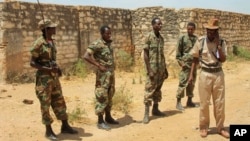NAIROBI, KENYA —
Ethiopia’s foreign ministry has denied there are plans to immediately withdraw all troops from Somalia, despite remarks by the Ethiopian prime minister expressing frustration with the pace of military progress in the country.
Speaking to parliament Tuesday, Ethiopian Prime Minister Hailemariam Desalegn said the African Union force in Somalia has not kept its promise to replace Ethiopian soldiers in parts of the country under AU control.
Ethiopian forces entered Somalia two years ago to assist the AU force, known as AMISOM, in its fight against al-Shabab militants. The Ethiopians have enjoyed success securing towns and cities in western Somalia.
But Hailemariam said the failure of AMISOM to replace Ethiopian troops influenced a decision in March to pull out of the town of Hudur, which was then retaken by al-Shabab.
In a statement Wednesday, the foreign ministry clarified the prime minister’s remarks, saying Ethiopia was “anxious to pull its forces out of Somalia” as soon as the Somali army and AMISOM take over from Ethiopian forces.
Foreign Ministry spokesman Dina Mufti told VOA Ethiopian forces are not planning to immediately pull out of the country.
“[The prime minister] said, Ethiopian defense force has to be transferred to those areas where there is need for more stability. He has never said we are going to withdraw," he said.
The prime minister noted that Ethiopia bears the cost of its military operation in Somalia alone, as Ethiopian forces are operating independent of AMISOM.
He said Ethiopia’s main focus should be “to accelerate our complete withdrawal towards our border.”
AMISOM spokesman Eloi Yao told VOA the peacekeeping force has not received any formal statement from Ethiopia regarding conditions for withdrawing forces.
He said in the event of a sudden pullback, the military commanders on the ground would work with the Somali government to decide a way forward.
“As you know, in military operations, plans are made and those plans can always be adjusted according to situations," said Yao.
Hailemariam’s remarks come ahead of a Somalia conference in London next month, aimed at coordinating development efforts for the country as it recovers from two decades of civil war.




